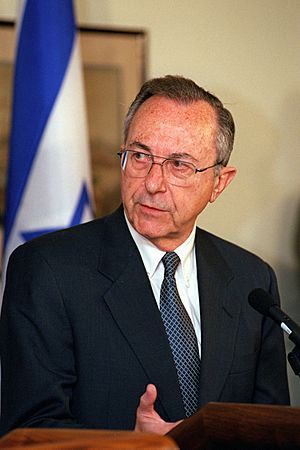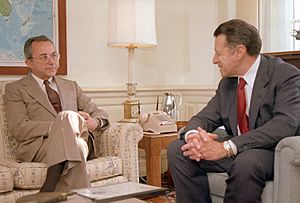Moshe Arens facts for kids
Quick facts for kids
Moshe Arens
|
|
|---|---|
 |
|
| Ministerial roles | |
| 1983–1984 | Minister of Defense |
| 1984–1988 | Minister without Portfolio |
| 1988–1990 | Minister of Foreign Affairs |
| 1990–1992 | Minister of Defense |
| 1999 | Minister of Defense |
| Faction represented in the Knesset | |
| 1973–1992 | Likud |
| 1999–2003 | Likud |
| Diplomatic roles | |
| 1982–1983 | Ambassador to the United States |
| Personal details | |
| Born | 27 December 1925 Kaunas, Lithuania |
| Died | 7 January 2019 (aged 93) Savyon, Israel |
Moshe Arens (born December 27, 1925 – died January 7, 2019) was a very important person in Israel. He was an engineer who designed airplanes, a scientist, a diplomat (someone who represents their country), and a politician from the Likud party.
He was a member of the Israeli parliament, called the Knesset, for many years (1973–1992 and 1999–2003). He also served as Israel's Minister of Defense three times and as Minister of Foreign Affairs once. Before that, he was Israel's ambassador to the United States. He also taught at the Technion university in Haifa.
Contents
Early Life and Education
Moshe Arens was born in Kaunas, Lithuania, into a Jewish family. His father was a factory owner, and his mother was a dentist. When he was one year old, his family moved to Riga, Latvia, where he went to elementary school.
In 1939, Arens and his family moved to the United States. They settled in New York City, and Arens attended George Washington High School. As a teenager, he was a leader in the Betar youth movement.
During World War II, Arens served in the United States Army Corps of Engineers. After Israel became an independent country in 1948, Arens moved there. He joined the Irgun, a Jewish defense group. He helped Jewish communities in North Africa and Europe form their own self-defense groups.
In 1949, he returned to Israel and helped start the Herut party. He also worked as an engineer, designing water systems for Tel Aviv. In 1951, he went back to the United States to study engineering at the Massachusetts Institute of Technology (MIT) and aeronautical engineering (airplane design) at the California Institute of Technology.
Academic and Research Work
In 1957, Arens became a professor of aeronautics at the Technion in Israel. He taught there until 1962.
Later in his life, after leaving government, he focused on researching the Jewish Military Union (ŻZW). This group fought alongside the Jewish Combat Organization (ŻOB) in the Warsaw Ghetto Uprising during World War II. Arens wrote many articles and a book called Flags over the Warsaw Ghetto about this brave uprising.
He also wrote columns for the Haaretz newspaper.
Business Career
From 1962 to 1971, Arens worked at Israel Aircraft Industries. He was a Deputy Director General and helped with big projects, including the development of the Kfir fighter jet.
Political Career Highlights
After the Yom Kippur War in 1973, Arens became involved in politics. He was elected to the Knesset (Israel's parliament) as a member of the Likud party.
He became chairman of the Foreign Affairs and Defense Committee in 1977. He disagreed with parts of the Camp David Accords and the Egypt–Israel peace treaty. In 1980, Prime Minister Menachem Begin offered him the role of Minister of Defense, but Arens turned it down because of his concerns about the peace treaty.

In 1982, Arens became Israel's ambassador to the United States. He brought his young assistant, Benjamin Netanyahu, to work with him in Washington, D.C.
In 1983, he returned to Israel and became Minister of Defense. He replaced Ariel Sharon. After the 1984 elections, he was appointed Minister without Portfolio.
In 1988, he became Minister of Foreign Affairs, with Netanyahu as his deputy. In 1990, he returned to the Defense Minister role.
After the Likud party lost the 1992 elections, Arens retired from politics. However, he came back in 1999 to challenge Netanyahu for the Likud leadership. Even though he didn't win, Netanyahu appointed him Minister of Defense again. He left the cabinet after the 1999 elections and lost his Knesset seat for the last time in 2003.
Arens often shared his opinions on important defense matters. He questioned some military purchases and was against Israel pulling out of the West Bank and Gaza on its own.
Personal Life
While living in the United States, Moshe Arens married Muriel F. Eisenberg. She moved to Israel with him. They had four children: Yigal, Aliza, Raanan, and Ruth. Moshe Arens passed away on January 7, 2019, at the age of 93.
Published Works
- Optimum staging of cruising aircraft. Haifa: Technion - Israel Institute of Technology, Department of Aeronautical Engineering, 1959.
- Some requirements for the efficient attainment of range by air-borne vehicles. Haifa: Technion - Israel Institute of Technology, Department of Aeronautical Engineering, 1959.
- A hypersonic ramjet using a normal detonation wave. Jerusalem: Weizmann Science Press of Israel, 1960.
- Moshe Arens, Statesman and Scientist Speaks Out. (With Merill Simon) New York: Dean Books, 1988.
- Broken covenant: American foreign policy and the crisis between the U.S. and Israel. New York: Simon & Schuster, 1995.
- Flags Over the Warsaw Ghetto: The Untold Story of the Warsaw Ghetto Uprising. Jerusalem: Gefen, 2011.
- In Defense of Israel: A Memoir of a Political Life. Washington DC: Brookings, 2018.
Awards and Recognition
In 1971, Moshe Arens received the Israel Defense Prize for his contributions. In 2016, he was given the Bonei Zion Prize by Nefesh B'Nefesh.
See also
 In Spanish: Moshe Arens para niños
In Spanish: Moshe Arens para niños
 | Sharif Bey |
 | Hale Woodruff |
 | Richmond Barthé |
 | Purvis Young |

